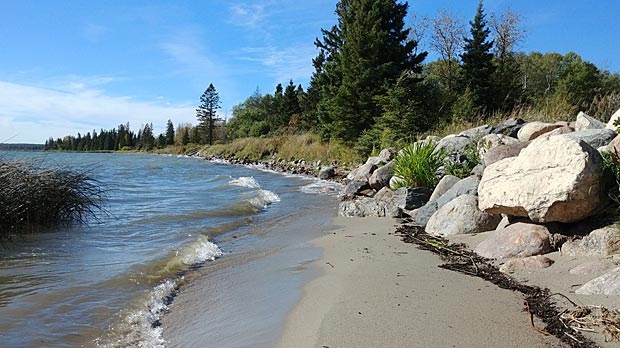
Businesses in the Clear Lake area are concerned about the future following a temporary ban on watercraft from entering the lake.
Parks Canada announced on Thursday that all personal watercraft, including vessels like canoes and paddle boards, are not allowed in Clear Lake.
The ban is being put in place after zebra mussels were found in the lake last year.
Dameon Wall, the external relations manager at Riding Mountain National Park, said zebra mussels can have devastating effects on any body of water.
“They change the ecology of that water body. They affect the food web, often having very bad effects for native fish populations, certainly for native mussel populations,” said Wall.
He said there will be a few exemptions to the ban – the Martese tour boat and a vessel from Keeseekoowenin Ojibway First Nation will both be allowed on the water, as well as any emergency vehicles or boats being used for scientific purposes.
The next step now that the ban is in place is to take water samples and send them back for testing.
“Those will be sent in for testing at the Freshwater Institute at the University of Manitoba that is run by Fisheries and Oceans Canada. The water samples there will be tested for environmental DNA for zebra mussels. And if we can find an area in the lake where we can identify an established colony, we are hoping to be able to do a treatment to get rid of them.”
There is a very short window to try and eradicate the colony if it is found, according to Wall. However, if it is determined the population is already widely established, Wall said it will be impossible to get rid of them.
“Should zebra mussels become established within Clear Lake, they will affect water bodies all the way from Riding Mountain National Park to The Forks in Downtown Winnipeg. That will have an impact for communities downstream, for First Nations, for industry, for agriculture, for the drinking water supply for tens of thousands of Manitobans.”
Ashley Smith, the owner and operator of Turtle Village, said she understands the need to ensure zebra mussels are dealt with, but is concerned with how quickly the decision to close the lake to boats was made, and what that could mean for her business.
“I’ve been asking for a management plan, specifically an environmental management plan. We need to plan for the future for sustainability. The environment and the business community as a tourism destination have to coexist,” said Smith.
She noted people come to the area to go to the lake, but taking away an avenue of enjoying the lake could be costly for her and other businesses in the area.
“Being around water is life-giving…when you can’t even access something that is so rich to us as human beings, it’s devastating. There should have been a plan in place to prevent this measure.”
Karly McRae, the president of Lakehouse Properties in Riding Mountain National Park, said this is a situation they have been monitoring.
“We’ve been really watching closely what our bookings are doing compared to 2023 and tracking our cancellations. We’re definitely seeing an impact,” said McRae.
McRae and Smith both said there needs to be more communication and consultation with the businesses in the community to ensure everyone is on the same page.
“I really hope that this is an opportunity for the community and Parks Canada, now that this announcement has been made for 2024, for us to come together with the various levels of government to discuss a solution for the future that allows Canadians to access Clear Lake with watercraft, but also ensure the health of Clear Lake for future generations.”
It was a thought process echoed by Premier Wab Kinew Friday, who said he was disappointed the situation has got to this point.
“Where was the action last summer, where were the actions in previous years to prevent zebra mussels from coming to Clear Lake?” said Kinew. “We got to do right by the lake and the environment, I think everybody gets that. Just the way it has been handled with a closure, and not a lot of conversation or consultation, I don’t think was the best approach.”
Kinew noted the voices of everyone who uses the area need to be heard when decisions of this magnitude are being made.
“The voice of Indigenous communities in the region have weight and they need to be taken into account. But the voice of the businesses also need to be taken into account, the voices of people using Clear Lake and other summer destinations across the region need to be taken into account. So we’re trying to take a balanced approach that is going to ensure that we look after the water and environment, but also we ensure that Manitobans can make the most of their summers. Not just this year, but also for generations to come.”
Wall notes the ban is in effect for 2024, but it is possible it could be relaxed early depending on what is found during testing.
He added people can still swim and fish from the shore, and that beach toys can still be used. He is reminding people to still dry off anything that goes into the water, and to not transfer wet items between bodies of water.